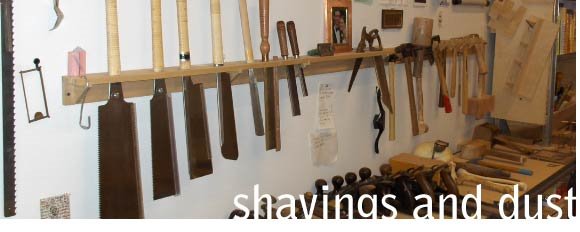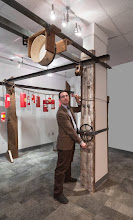Though my photo was submitted after the deadline she was kind enough to include it anyway, for which I am thankful. It is an interesting question and an interesting idea, as we hear so much about values from the politicians and the talking heads. I am glad that she tackled the question and was happy to be able to participate.

I did not have to think long to find my answer to her question ("what is one of your core values?"). Working with my hands (in whatever capacity) is so important to me that I have a hard time coming up with what I would do if I could not. It is central to my livelihood and to my life. I play guitar, I make things, I cook, I plant things. I am working to teach my son to do the same, and as he sits on the end of my workbench and watches my hands work he tries to copy the actions I am making, so I have a feeling that he is headed down this same road. A couple of years ago I wrote this paean to my hands, and I still feel the same sense of awe when they do what I want them to and when I see what they can produce.
Working with my hands is important to me in another way: It is central to my politics. In my grandfather's generation, most Americans worked with their hands as a matter of course. Materials were precious in a different way, and most households had a saw or two, a hammer, a couple of hand planes. Not everyone was a furniture maker, of course, but everyone was able to use their hands to make things and fix things. My grandmother knew how to pluck chickens, and did so regularly. The objects in their lives and their homes were, for the most part, mechanical, and repairing them or improving them was within the average person's realm of understanding.
Of course, the average life expectancy for men was 43, for women 35. It is so hard for me to not dive headlong into the pool of nostalgia. But that is not what I was writing about. I was writing about politics.
We live in a very different world, now. a world in which the things that surround us are so complicated that even if we had a desire to fix them, the vast majority of us would not know how. This computer, for example: When it does not work, my ability to fix it is limited entirely to turning it off and then on again, in the hopes that it will magically fix itself. I might as well burn some sage and wave the smoke over the thing for all the knowledge I have with regard to repairing it. In almost every respect, this object, like my car and my television and even my alarm clock function for all the world like magic.
The same is true for the systems that govern my life.
Think about it: Do you know where the power plant is that makes the lights come on when you flip the switch? Or where the water comes from when you turn on the faucet (or less apetizingly where it goes)? What about the factory where the shirt you are wearing right now was made? Or the processes and machines that were used to make it? Or the food you ate for dinner? The gas that you put in your car?
We are surrounded by systems and items that, when examined, are pure mystery, and we are encouraged by the providers of those systems and items to keep it that way. I have a theory why that is, and it is pretty sinister.
The less we question these things, the more likely we are to just pay for them so that we can go about our daily lives. I would much rather pay someone minimum wage or less to pluck chickens for me so that I don't have to do that messy, cold, foul job myself. I get a plucked, skinned chicken breast for dinner, and I don't have to think about how it went from running around a henhouse to sitting on my plate. I also don't have to think about the person who raised it, and what their working and living conditions are, or the person who slaughtered it and how they live. Or even the person who packaged it, trucked it to the store (trucking accounts for over 25% of annual Green House Gas emissions in the US annually), took it off the truck, stocked it on the shelf, or rang it up at the cash register. I just get my chicken breast.
We can do the same thought experiment for anything, of course. Textiles and clothing is another chilling one. Or plastic toys. Or plastic anything, really.
The companies that sell us stuff don't want us to think about the processes of making the stuff, because if we really did we would be more thoughtful about the things in our lives and less likely to buy so much stuff. As long as we are told not to consider the processes and systems that run our lives, as long as we surrender that much of our free will, we willingly subjugate ourselves to the interests of large corporations.
Which brings me back to using my hands to make stuff (you thought I would forget that part, didn't you?).
When we wanted a coffee table, for example, we were faced with two basic choices: Buy one or make one. If we had bought one, my son (who is in a real phase of hitting things these days) would probably have destroyed it in a couple of years, and we would have thrown it out and gotten another one. Since I chose to make one, though (maybe I will do a post about that one of these days), it occupies a very different place in the emotional map of our lives, and we care for it more meticulously. It is a lot more likely to be a part of our lives until our son has a house of his own and needs a coffee table. The product of working with my hands will have a long and useful existence, and at least until I am dead will not be seen as an object that can be thrown away.
What if we could apply that to more of the things in our lives? What if we knew the farmers that grow our food? The folks who make our clothes? It is not particularly possible for all of us to make everything in our lives, of course, but what if we could make SOME of the things in our lives and the rest were provided locally by people that we knew and trusted?
What if (to flip it around) we chose NOT to trust large corporations, who have no allegiance whatsoever to my community, or to ecological or social responsibility? What if we all just started to choose to make more, buy less, and think often about how we live?
To quote Arlo, then my friends we would have a revolution. Not a bad idea.


2 comments:
Thank YOU! I wish everyone would write the story of his or her photo!
Amen!
Post a Comment